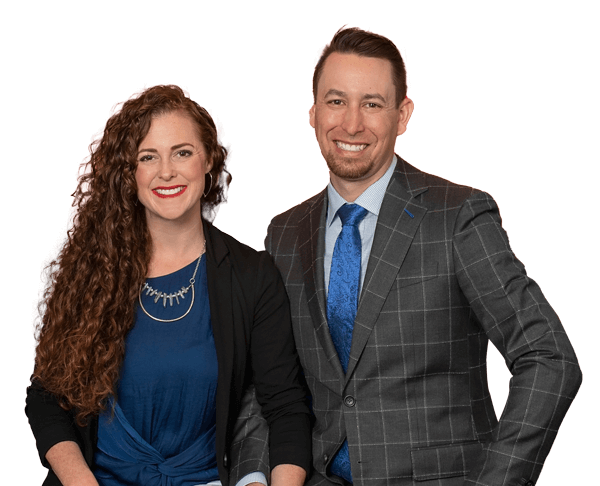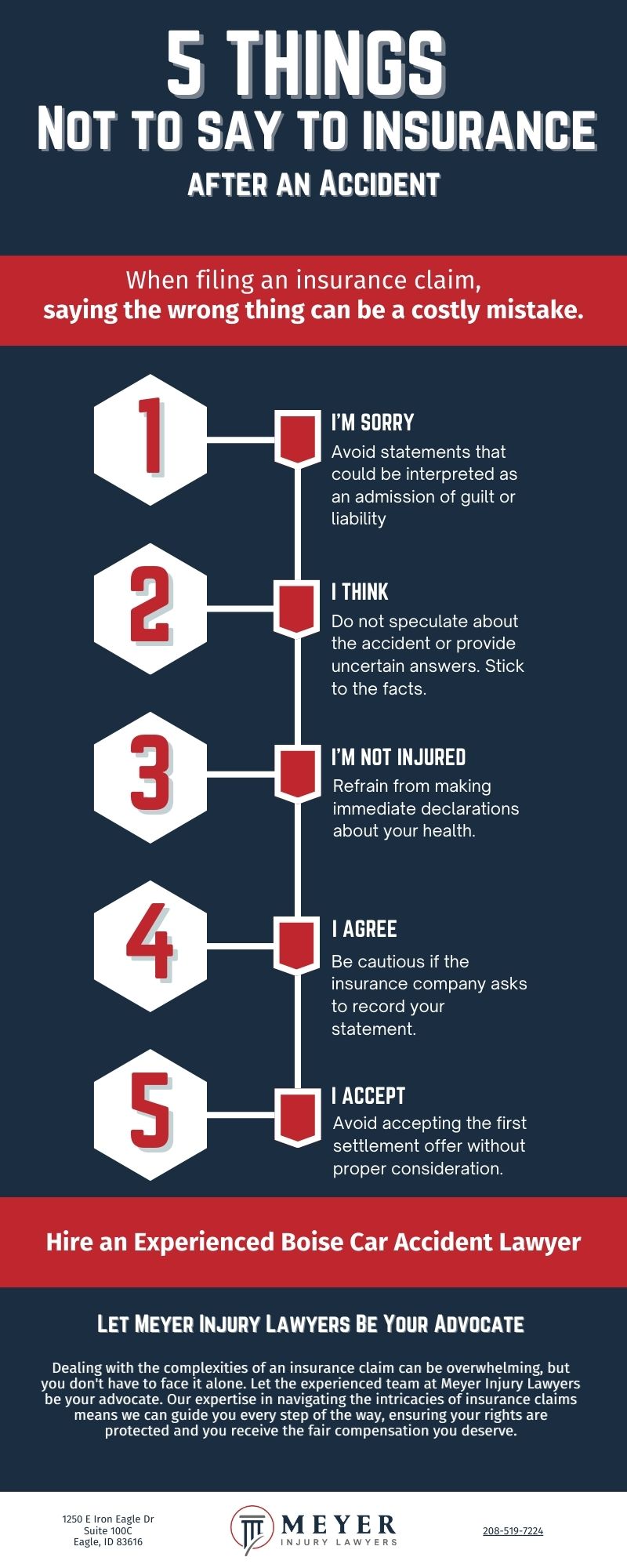Menu
Boise:
Sacramento:
Boise:
Sacramento:

Navigating a car insurance claim can be a daunting process, especially in the aftermath of an accident. As experienced professionals at Meyer Injury Lawyers, we understand the intricacies involved and are here to provide you with essential dos and don'ts to help you through this process.
Dealing with insurance claims after a car accident can be daunting and complicated. A car accident lawyer simplifies this process and protects your rights. At Meyer Injury Lawyers, we specialize in assisting clients through the intricacies of insurance claims. Here's how our legal experience can be invaluable in your situation:

Successfully navigating a car insurance claim requires careful steps. This concise guide from Meyer Injury Lawyers outlines crucial dos and don'ts, helping you manage your claim effectively and safeguard your rights.
After being involved in a car accident, it’s crucial to communicate effectively with your insurance company. However, you should avoid certain statements and admissions as they could potentially harm your claim or affect your ability to receive fair compensation. At Meyer Injury Lawyers, we advise our clients to be cautious in their communications with insurers. Here are key things you should not say to your insurer after an accident:
Avoid statements that could be interpreted as an admission of guilt or liability. Even saying "I'm sorry" can be misconstrued as an admission of fault. Liability should be determined by the insurance adjusters after a full investigation.
Do not speculate about the accident or provide uncertain answers. Stick to the facts. Speculations can be used against you, especially if they conflict with the evidence.
Refrain from making immediate declarations about your health. Some injuries, especially those related to trauma or whiplash, may not be immediately apparent.
While you need to provide basic information, avoid sharing extensive personal details. For instance, you don’t need to disclose your daily routine, income, or other irrelevant personal data.
Be cautious if the insurance company asks to record your statement. You are not obligated to agree to this, and it is often advisable to speak to a lawyer first.
Avoid accepting the first settlement offer without proper consideration. Initial offers may not fully cover all your expenses and losses. Always review and understand the offer fully, and consult with a lawyer if necessary.
Be careful not to provide a definitive statement too soon. Gather all relevant facts and understand the situation fully before making an official statement.
Even if you haven’t consulted a lawyer, disclosing this to your insurance company is unnecessary. Knowing you don’t have legal representation might affect how they handle your claim.
Avoid giving uncertain answers. If you don't know the answer to a question, it's better to say so rather than guessing.
Avoid closing off your statement by implying you have nothing more to add. There might be additional relevant information that emerges later.
When faced with needing an insurance claim, taking the right steps is crucial for ensuring a smooth process and fair outcome. Here are some important actions to consider:
If you have any doubts or legal questions regarding your claim, it’s wise to seek advice from a professional attorney.
Understand your coverage by thoroughly reviewing your insurance policies. This helps you know what is covered and what exclusions may apply.
Contact your insurance provider as soon as possible after the incident. Prompt notification is essential for the claims process.
Take clear pictures of your vehicle, the accident site, and any injuries incurred. When communicating with insurance representatives, take detailed notes, including:
Provide accurate and complete information. Any discrepancies or withholding of information can affect your coverage and claim validity.
Save receipts for any expenses related to your claim, such as Medical Expenses (e.g., hospital bills, ambulance bills, co-pays), transportation costs (e.g., rental car, rideshare, towing fees), and any other out-of-pocket expenses., until your insurance company fully resolves your case.
By following these guidelines, you can effectively navigate the insurance claim process. Remember, being informed, organized, and honest is key to successfully managing your claim. Meyer Injury Lawyers are here to help if you need assistance or legal representation.
Navigating a car insurance claim post-accident can be overwhelming, but you don't have to handle it alone. At Meyer Injury Lawyers, we're here to guide and support you through every step.
Secure your rights and get the compensation you deserve. Reach out to us today for a consultation. With our experience and guidance, you can focus on your recovery while we care for the legalities. Call now to start your journey towards a stress-free claim process.
It's best to file a claim as soon as possible, typically within 24 to 48 hours after the accident. Prompt filing ensures that details are accurate and helps expedite the claim process.
You should provide details of the accident, including the date, time, location, a description of what happened, photos of the accident scene, and contact information of any witnesses or other parties involved.
This depends on your insurance provider and the specifics of the accident. Factors like your driving history, the nature of the claim, and who was at fault can influence rate changes. Typically, if you are not at-fault, the accident will not affect your premium.
Report the accident to your insurance company. If you have uninsured motorist coverage, it may cover damages. It's also advisable to consult with a lawyer in such situations.
In most cases, yes. However, some insurance companies may strongly suggest you to use their approved service providers or a direct repair program (DRP). Check with your insurer for their specific policy and do your own research for a repair shop
The time it takes to settle a claim can vary widely depending on the complexity of the accident, the extent of the damages, and the responsiveness of all parties involved.
You can negotiate with the insurer if you believe the valuation is too low. Providing additional documentation or getting an independent assessment can help your case.
While not always mandatory, a police report can provide an unbiased account of the accident and can be beneficial in processing your claim.
Once a claim is settled, it’s typically considered closed. It's important to thoroughly check for damages before settling. However, if new information arises, contact your insurer to discuss the situation.
Be cautious with initial offers, as they may not fully cover your damages. It’s often beneficial to review the offer with a lawyer before accepting.

Attorney Advertising | Prior results do not guarantee a similar outcome. The information on this website is for general information purposes only. Nothing on this site should be taken as legal advice for any individual case or situation. This information is not intended to create, and receipt or viewing does not constitute, an attorney-client relationship. This site is protected by reCAPTCHA and the Google Privacy Policy and Terms of Service apply.